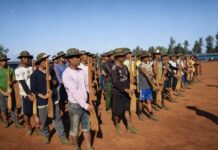Lately, there was news from the government that the United Wa State Army (UWSA) and National Democratic Alliance Army (NDAA) or Mongla are now ready to accept the Nationwide Ceasefire Agreement (NCA)-based peace process and were prepared to sign it pending further deliberation.
However the UWSA was irked because of the news revealed by U Aung Soe from the government Peace Commission (PC) who said: “Because of China’s help and unofficial discussion with the PC, both (UWSA and NDAA) have accepted the NCA. But to be able to sign more discussions will have to be carried out.”
Mongla’s spokesman U Kyi Myint took pains to say: “We are not against the NCA but as it needs a bit more to be comprehensive, we must discuss it further,”according to media reports.
The UWSA-led seven-member Federal Political Negotiation Consultative Committee (FPNCC), also known as the Northern Alliance-Burma, also took a similar position, it rejects the NCA-based peace process plan as being unable to resolve the problem of ethnic conflict.
On March 16, the UWSA came up with a clarification statement saying that the National Ceasefire (NC) and NCA are two different matters. While it is committed to achieving the NC, it does not mean that it agrees to the NCA, which it has had no hand in its drafting.
It’s position, together with the FPNCC members is a ceasefire agreement should come first, followed by political negotiations and eventual political settlement.
According to its proposal, “Provincial and Federal Peace Agreement and National-Parliament-level Ceasefire Agreement by and between Republic Government of the Union of Myanmar and All Ethnic revolutionary Armed Forces”, made public during the second 21st Century Panglong Conference which includes details similar to an international armistice agreement complete with demarcation, monitoring arbitration and other mechanism, should lead to earnest political negotiation between the government and the Ethnic Armed Organizations (EAOs) within 90 days, after which the treaty will have no more effect.
Regarding its political stance “The General Principles and Specific Proposition of Revolutionary Armed Organizations of all Nationalities upon the Political Negotiation” outlined 15 topics aimed at amendment or redrafting of the Military drawn, 2008 constitution.

In a nutshell, it is more on the confederacy system rather than federalism with more decentralization along ethnic lines, suggesting that if an ethnic group has 100,000 it should be accorded an autonomous region; 200,000 autonomous prefecture; and 300,000 national state. It also indicated that the 25% parliamentary seats given to the Tatmadaw should also be allotted to the ethnic nationalities.
A chief concern among the powers that be could be the proposition of the ethnic armies’ future. The position paper said: “The Myanmar ethnic issues are extremely complex. It is not easy to achieve the target of one country, one military, it will be a long process, even if all of the ethnic group armies accept the adaptation.”
It further explained the problem of the armistice and ethnic equality must be in place first and only after the two mentioned issues are legally resolved and practiced will the ethnic armies issue be ripe for a final settlement. In other words, the demobilization of the ethnic armies prepared for a final battlement. In other words, the demobilization of the ethnic groups won’t come into question some times.
Given such circumstances, the PC’s eagerness to shed positive light might be seen as propaganda, which the Wa and the FPNCC see as eroding its alternative approach to the government endorsed NCA-based peace negotiation process and thus its political credibility among its members and all EAOs as a whole.











Leave a Comments